
kornia
Geometric Computer Vision Library for Spatial AI
Stars: 9891
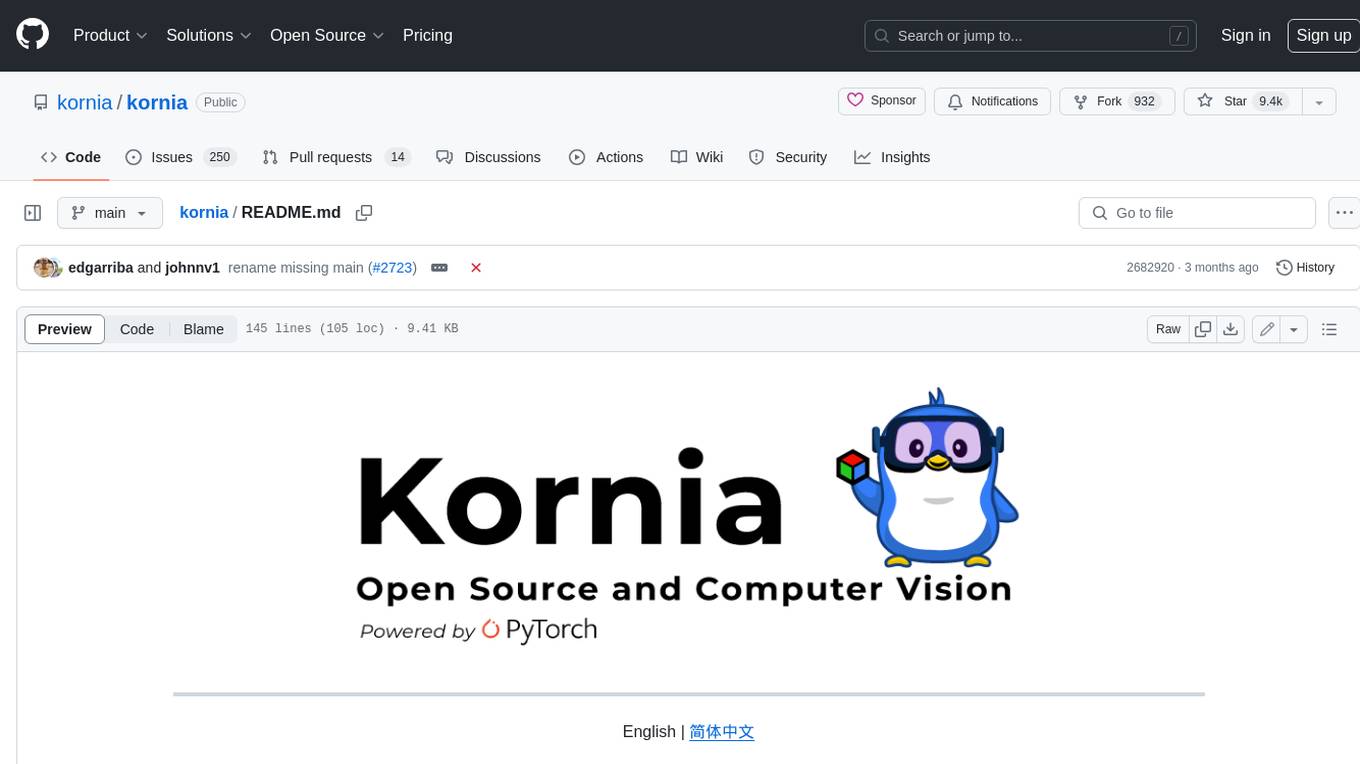
Kornia is a differentiable computer vision library for PyTorch. It consists of a set of routines and differentiable modules to solve generic computer vision problems. At its core, the package uses PyTorch as its main backend both for efficiency and to take advantage of the reverse-mode auto-differentiation to define and compute the gradient of complex functions.
README:
Kornia is a differentiable computer vision library that provides a rich set of differentiable image processing and geometric vision algorithms. Built on top of PyTorch, Kornia integrates seamlessly into existing AI workflows, allowing you to leverage powerful batch transformations, auto-differentiation and GPU acceleration. Whether you’re working on image transformations, augmentations, or AI-driven image processing, Kornia equips you with the tools you need to bring your ideas to life.
-
Differentiable Image Processing
Kornia provides a comprehensive suite of image processing operators, all differentiable and ready to integrate into deep learning pipelines.- Filters: Gaussian, Sobel, Median, Box Blur, etc.
- Transformations: Affine, Homography, Perspective, etc.
- Enhancements: Histogram Equalization, CLAHE, Gamma Correction, etc.
- Edge Detection: Canny, Laplacian, Sobel, etc.
- ... check our docs for more.
-
Advanced Augmentations
Perform powerful data augmentation with Kornia’s built-in functions, ideal for training AI models with complex augmentation pipelines.- Augmentation Pipeline: AugmentationSequential, PatchSequential, VideoSequential, etc.
- Automatic Augmentation: AutoAugment, RandAugment, TrivialAugment.
-
AI Models
Leverage pre-trained AI models optimized for a variety of vision tasks, all within the Kornia ecosystem.- Face Detection: YuNet
- Feature Matching: LoFTR, LightGlue
- Feature Descriptor: DISK, DeDoDe, SOLD2
- Segmentation: SAM
- Classification: MobileViT, VisionTransformer.
See here for some of the methods that we support! (>500 ops in total !)
| Category | Methods/Models |
|---|---|
| Image Processing | - Color conversions (RGB, Grayscale, HSV, etc.) - Geometric transformations (Affine, Homography, Resizing, etc.) - Filtering (Gaussian blur, Median blur, etc.) - Edge detection (Sobel, Canny, etc.) - Morphological operations (Erosion, Dilation, etc.) |
| Augmentation | - Random cropping, Erasing - Random geometric transformations (Affine, flipping, Fish Eye, Perspecive, Thin plate spline, Elastic) - Random noises (Gaussian, Median, Motion, Box, Rain, Snow, Salt and Pepper) - Random color jittering (Contrast, Brightness, CLAHE, Equalize, Gamma, Hue, Invert, JPEG, Plasma, Posterize, Saturation, Sharpness, Solarize) - Random MixUp, CutMix, Mosaic, Transplantation, etc. |
| Feature Detection | - Detector (Harris, GFTT, Hessian, DoG, KeyNet, DISK and DeDoDe) - Descriptor (SIFT, HardNet, TFeat, HyNet, SOSNet, and LAFDescriptor) - Matching (nearest neighbor, mutual nearest neighbor, geometrically aware matching, AdaLAM LightGlue, and LoFTR) |
| Geometry | - Camera models and calibration - Stereo vision (epipolar geometry, disparity, etc.) - Homography estimation - Depth estimation from disparity - 3D transformations |
| Deep Learning Layers | - Custom convolution layers - Recurrent layers for vision tasks - Loss functions (e.g., SSIM, PSNR, etc.) - Vision-specific optimizers |
| Photometric Functions | - Photometric loss functions - Photometric augmentations |
| Filtering | - Bilateral filtering - DexiNed - Dissolving - Guided Blur - Laplacian - Gaussian - Non-local means - Sobel - Unsharp masking |
| Color | - Color space conversions - Brightness/contrast adjustment - Gamma correction |
| Stereo Vision | - Disparity estimation - Depth estimation - Rectification |
| Image Registration | - Affine and homography-based registration - Image alignment using feature matching |
| Pose Estimation | - Essential and Fundamental matrix estimation - PnP problem solvers - Pose refinement |
| Optical Flow | - Farneback optical flow - Dense optical flow - Sparse optical flow |
| 3D Vision | - Depth estimation - Point cloud operations - Nerf |
| Image Denoising | - Gaussian noise removal - Poisson noise removal |
| Edge Detection | - Sobel operator - Canny edge detection |
| Transformations | - Rotation - Translation - Scaling - Shearing |
| Loss Functions | - SSIM (Structural Similarity Index Measure) - PSNR (Peak Signal-to-Noise Ratio) - Cauchy - Charbonnier - Depth Smooth - Dice - Hausdorff - Tversky - Welsch |
| Morphological Operations | - Dilation - Erosion - Opening - Closing |
Kornia is an open-source project that is developed and maintained by volunteers. Whether you're using it for research or commercial purposes, consider sponsoring or collaborating with us. Your support will help ensure Kornia's growth and ongoing innovation. Reach out to us today and be a part of shaping the future of this exciting initiative!

pip install korniaOther installation options
pip install -e .pip install git+https://github.com/kornia/korniaKornia is not just another computer vision library — it's your gateway to effortless Computer Vision and AI.
import numpy as np
import kornia_rs as kr
from kornia.augmentation import AugmentationSequential, RandomAffine, RandomBrightness
from kornia.filters import StableDiffusionDissolving
# Load and prepare your image
img: np.ndarray = kr.read_image_any("img.jpeg")
img = kr.resize(img, (256, 256), interpolation="bilinear")
# alternatively, load image with PIL
# img = Image.open("img.jpeg").resize((256, 256))
# img = np.array(img)
img = np.stack([img] * 2) # batch images
# Define an augmentation pipeline
augmentation_pipeline = AugmentationSequential(
RandomAffine((-45., 45.), p=1.),
RandomBrightness((0.,1.), p=1.)
)
# Leveraging StableDiffusion models
dslv_op = StableDiffusionDissolving()
img = augmentation_pipeline(img)
dslv_op(img, step_number=500)
dslv_op.save("Kornia-enhanced.jpg")Are you passionate about computer vision, AI, and open-source development? Join us in shaping the future of Kornia! We are actively seeking contributors to help expand and enhance our library, making it even more powerful, accessible, and versatile. Whether you're an experienced developer or just starting, there's a place for you in our community.
We are excited to announce our latest advancement: a new initiative designed to seamlessly integrate lightweight AI models into Kornia. We aim to run any models as smooth as big models such as StableDiffusion, to support them well in many perspectives. We have already included a selection of lightweight AI models like YuNet (Face Detection), Loftr (Feature Matching), and SAM (Segmentation). Now, we're looking for contributors to help us:
- Expand the Model Selection: Import decent models into our library. If you are a researcher, Kornia is an excellent place for you to promote your model!
- Model Optimization: Work on optimizing models to reduce their computational footprint while maintaining accuracy and performance. You may start from offering ONNX support!
- Model Documentation: Create detailed guides and examples to help users get the most out of these models in their projects.
Kornia's foundation lies in its extensive collection of classic computer vision operators, providing robust tools for image processing, feature extraction, and geometric transformations. We continuously seek for contributors to help us improve our documentation and present nice tutorials to our users.
If you are using kornia in your research-related documents, it is recommended that you cite the paper. See more in CITATION.
@inproceedings{eriba2019kornia,
author = {E. Riba, D. Mishkin, D. Ponsa, E. Rublee and G. Bradski},
title = {Kornia: an Open Source Differentiable Computer Vision Library for PyTorch},
booktitle = {Winter Conference on Applications of Computer Vision},
year = {2020},
url = {https://arxiv.org/pdf/1910.02190.pdf}
}We appreciate all contributions. If you are planning to contribute back bug-fixes, please do so without any further discussion. If you plan to contribute new features, utility functions or extensions, please first open an issue and discuss the feature with us. Please, consider reading the CONTRIBUTING notes. The participation in this open source project is subject to Code of Conduct.
- Forums: discuss implementations, research, etc. GitHub Forums
- GitHub Issues: bug reports, feature requests, install issues, RFCs, thoughts, etc. OPEN
- Slack: Join our workspace to keep in touch with our core contributors and be part of our community. JOIN HERE
Made with contrib.rocks.
Kornia is released under the Apache 2.0 license. See the LICENSE file for more information.
For Tasks:
Click tags to check more tools for each tasksFor Jobs:
Alternative AI tools for kornia
Similar Open Source Tools

kornia
Kornia is a differentiable computer vision library for PyTorch. It consists of a set of routines and differentiable modules to solve generic computer vision problems. At its core, the package uses PyTorch as its main backend both for efficiency and to take advantage of the reverse-mode auto-differentiation to define and compute the gradient of complex functions.
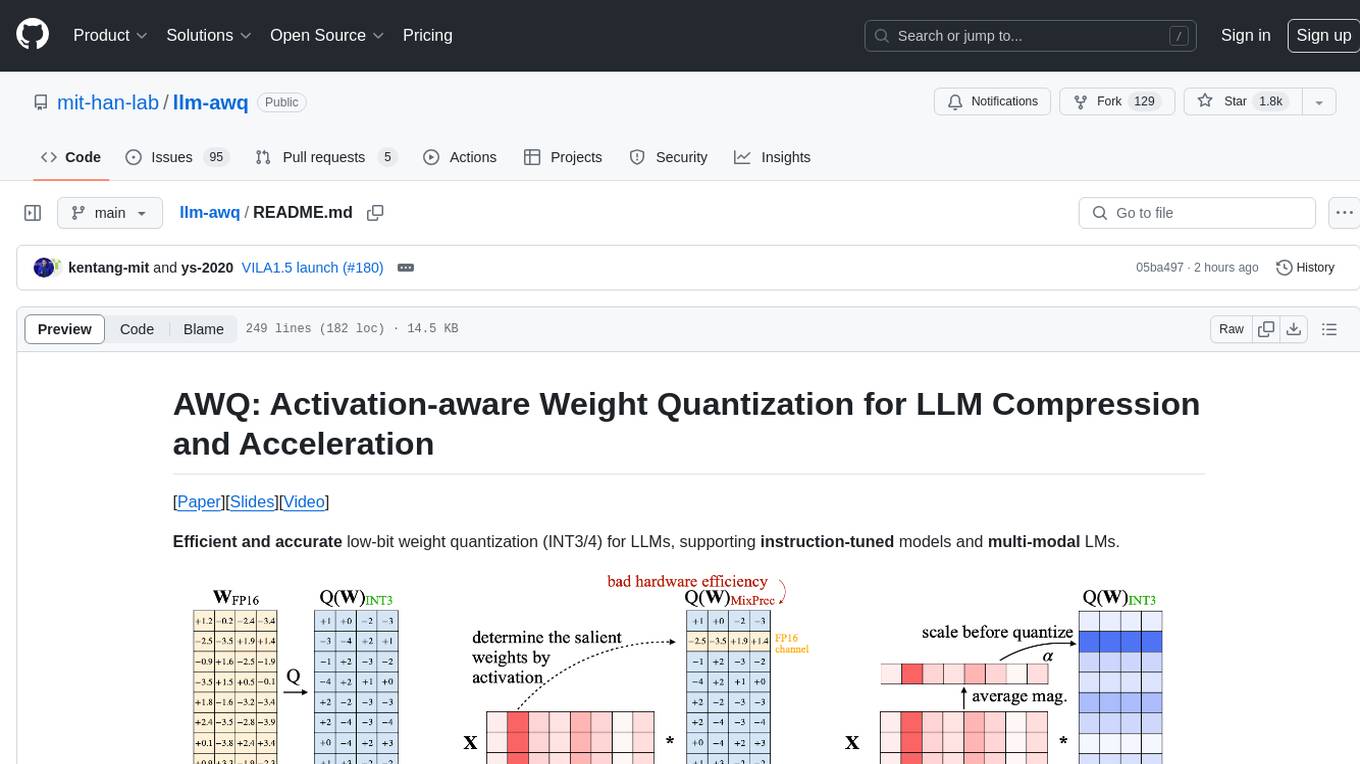
llm-awq
AWQ (Activation-aware Weight Quantization) is a tool designed for efficient and accurate low-bit weight quantization (INT3/4) for Large Language Models (LLMs). It supports instruction-tuned models and multi-modal LMs, providing features such as AWQ search for accurate quantization, pre-computed AWQ model zoo for various LLMs, memory-efficient 4-bit linear in PyTorch, and efficient CUDA kernel implementation for fast inference. The tool enables users to run large models on resource-constrained edge platforms, delivering more efficient responses with LLM/VLM chatbots through 4-bit inference.
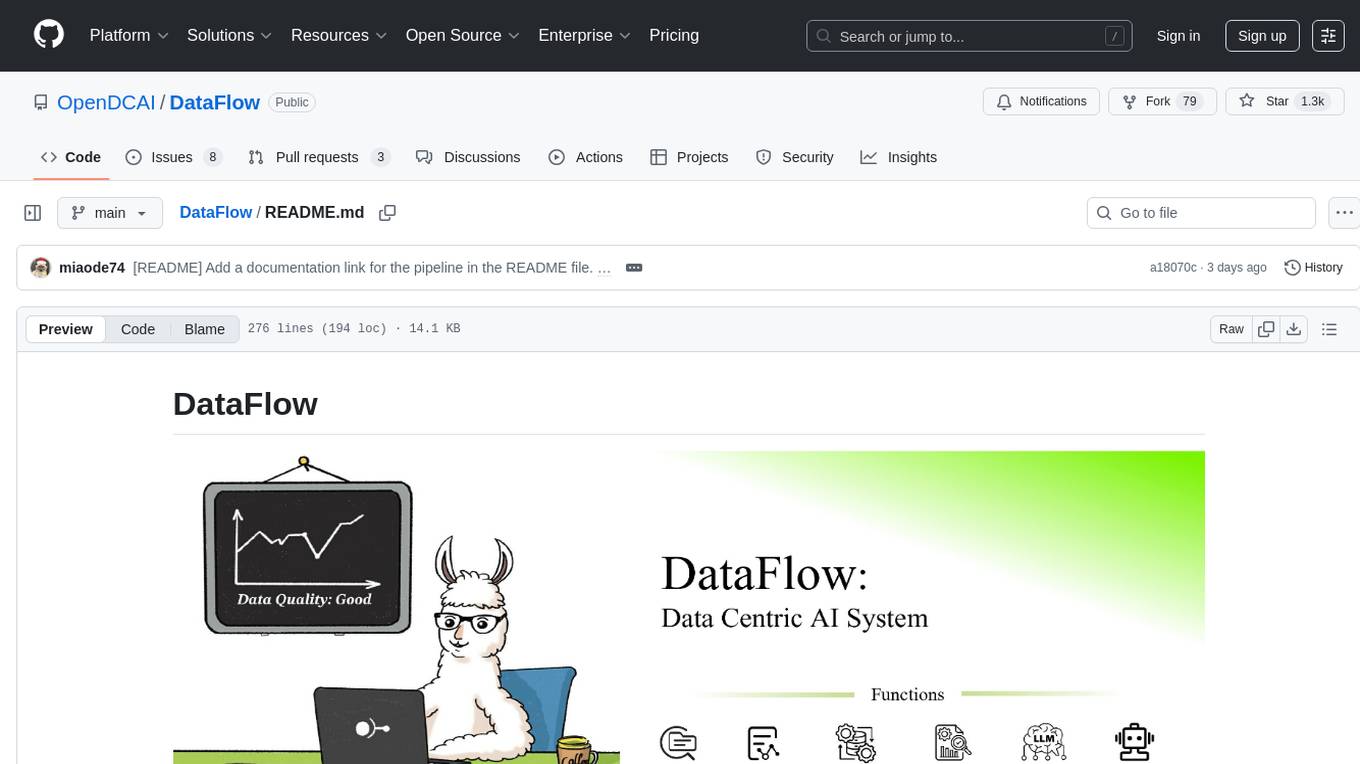
DataFlow
DataFlow is a data preparation and training system designed to parse, generate, process, and evaluate high-quality data from noisy sources, improving the performance of large language models in specific domains. It constructs diverse operators and pipelines, validated to enhance domain-oriented LLM's performance in fields like healthcare, finance, and law. DataFlow also features an intelligent DataFlow-agent capable of dynamically assembling new pipelines by recombining existing operators on demand.
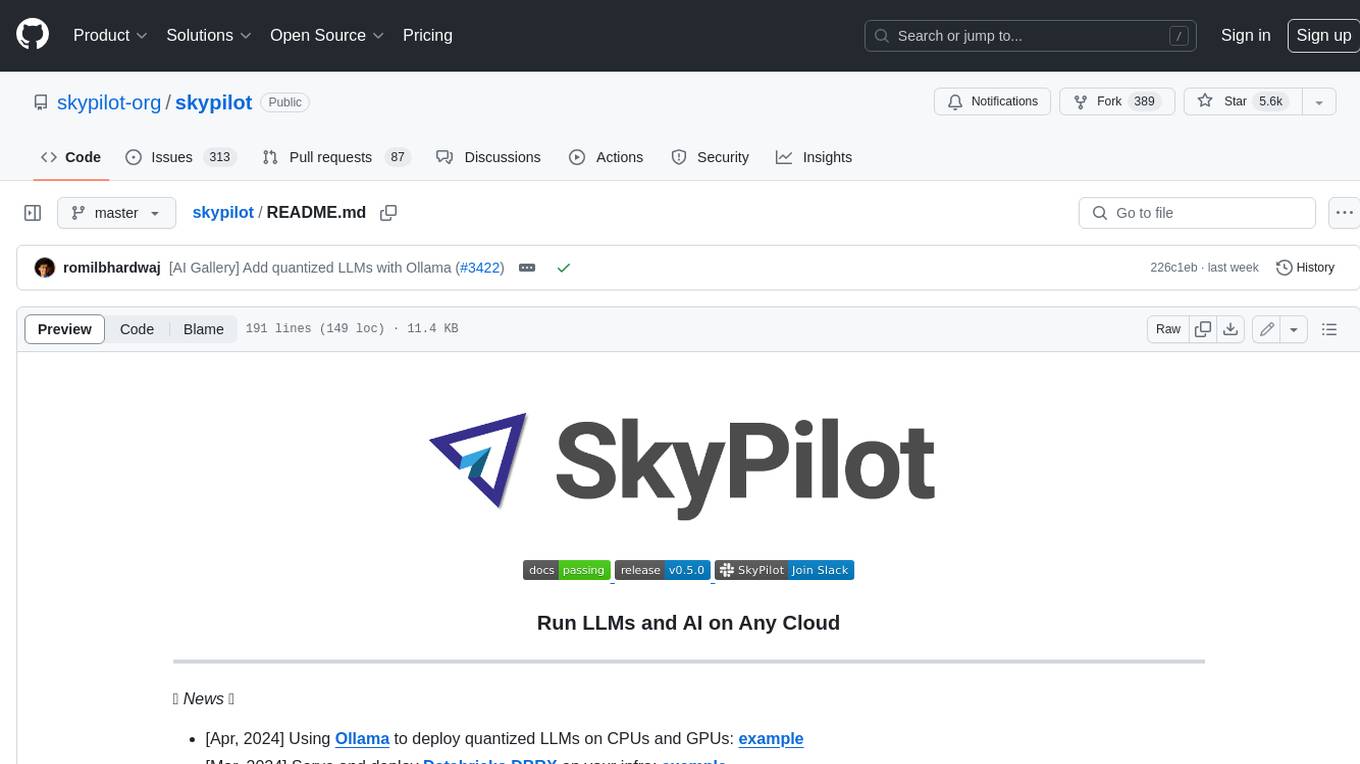
skypilot
SkyPilot is a framework for running LLMs, AI, and batch jobs on any cloud, offering maximum cost savings, highest GPU availability, and managed execution. SkyPilot abstracts away cloud infra burdens: - Launch jobs & clusters on any cloud - Easy scale-out: queue and run many jobs, automatically managed - Easy access to object stores (S3, GCS, R2) SkyPilot maximizes GPU availability for your jobs: * Provision in all zones/regions/clouds you have access to (the _Sky_), with automatic failover SkyPilot cuts your cloud costs: * Managed Spot: 3-6x cost savings using spot VMs, with auto-recovery from preemptions * Optimizer: 2x cost savings by auto-picking the cheapest VM/zone/region/cloud * Autostop: hands-free cleanup of idle clusters SkyPilot supports your existing GPU, TPU, and CPU workloads, with no code changes.
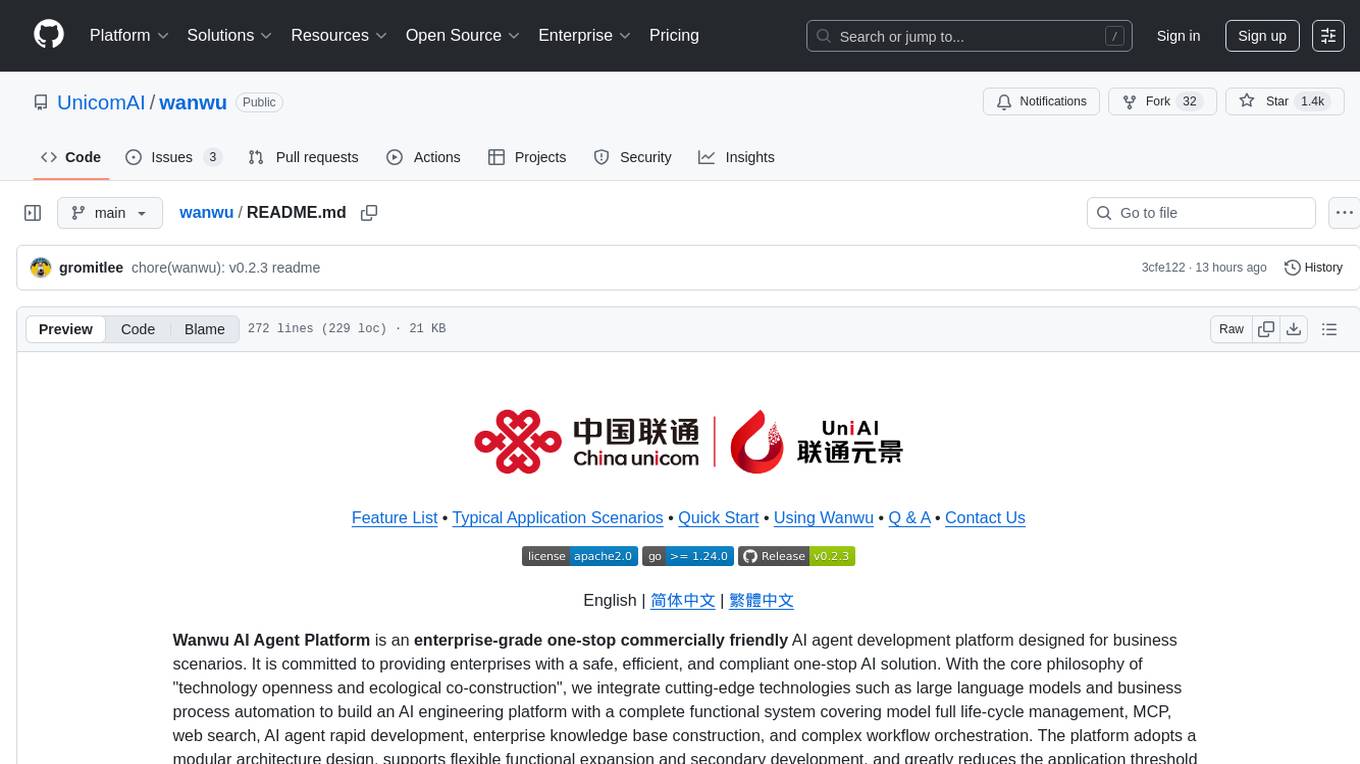
wanwu
Wanwu AI Agent Platform is an enterprise-grade one-stop commercially friendly AI agent development platform designed for business scenarios. It provides enterprises with a safe, efficient, and compliant one-stop AI solution. The platform integrates cutting-edge technologies such as large language models and business process automation to build an AI engineering platform covering model full life-cycle management, MCP, web search, AI agent rapid development, enterprise knowledge base construction, and complex workflow orchestration. It supports modular architecture design, flexible functional expansion, and secondary development, reducing the application threshold of AI technology while ensuring security and privacy protection of enterprise data. It accelerates digital transformation, cost reduction, efficiency improvement, and business innovation for enterprises of all sizes.
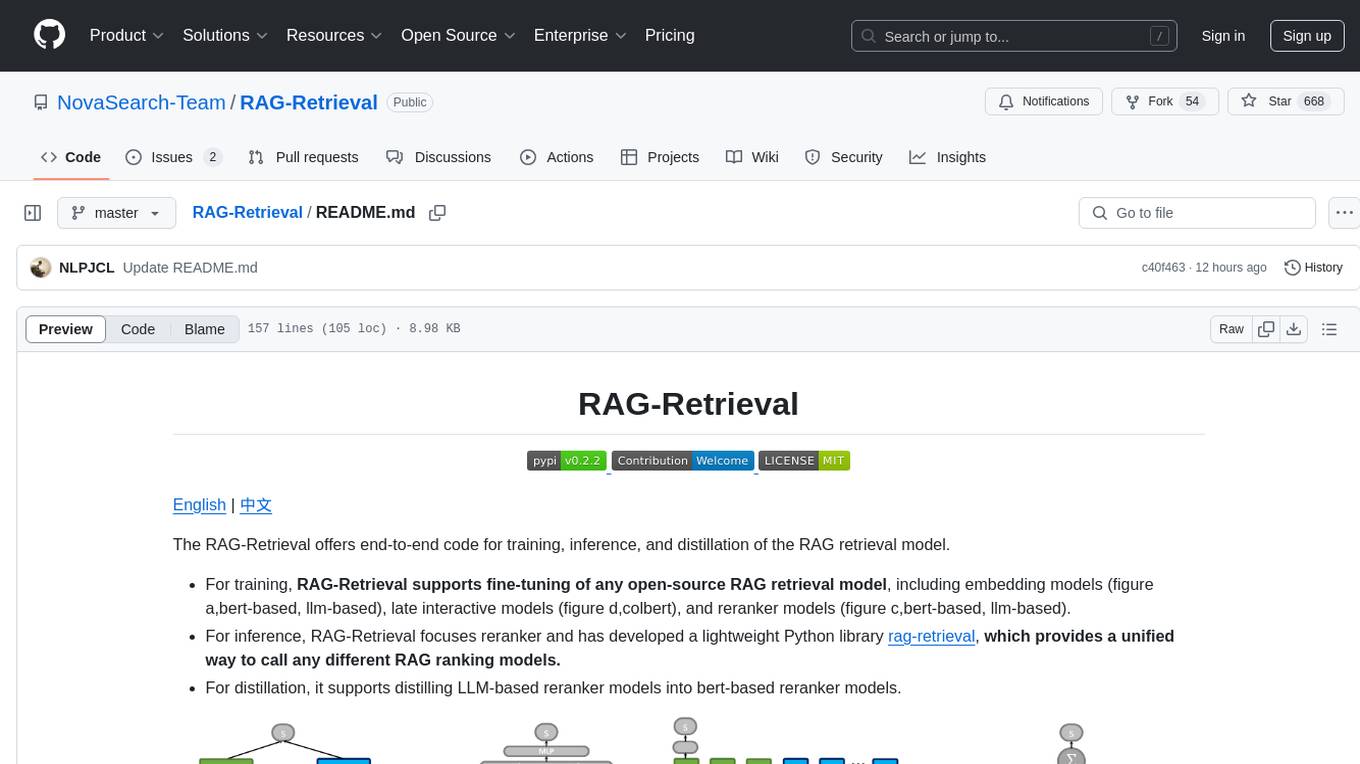
RAG-Retrieval
RAG-Retrieval is an end-to-end code repository that provides training, inference, and distillation capabilities for the RAG retrieval model. It supports fine-tuning of various open-source RAG retrieval models, including embedding models, late interactive models, and reranker models. The repository offers a lightweight Python library for calling different RAG ranking models and allows distillation of LLM-based reranker models into bert-based reranker models. It includes features such as support for end-to-end fine-tuning, distillation of large models, advanced algorithms like MRL, multi-GPU training strategy, and a simple code structure for easy modifications.
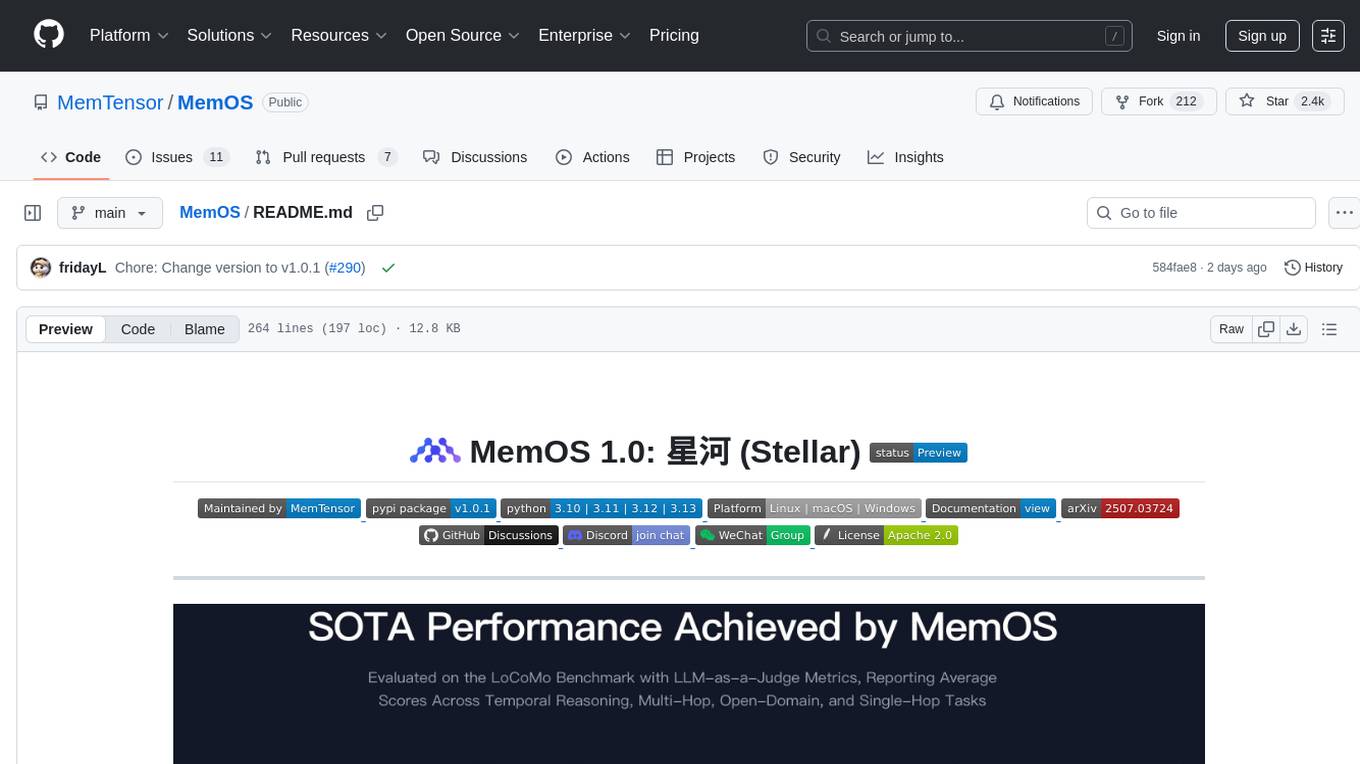
MemOS
MemOS is an operating system for Large Language Models (LLMs) that enhances them with long-term memory capabilities. It allows LLMs to store, retrieve, and manage information, enabling more context-aware, consistent, and personalized interactions. MemOS provides Memory-Augmented Generation (MAG) with a unified API for memory operations, a Modular Memory Architecture (MemCube) for easy integration and management of different memory types, and multiple memory types including Textual Memory, Activation Memory, and Parametric Memory. It is extensible, allowing users to customize memory modules, data sources, and LLM integrations. MemOS demonstrates significant improvements over baseline memory solutions in multiple reasoning tasks, with a notable improvement in temporal reasoning accuracy compared to the OpenAI baseline.
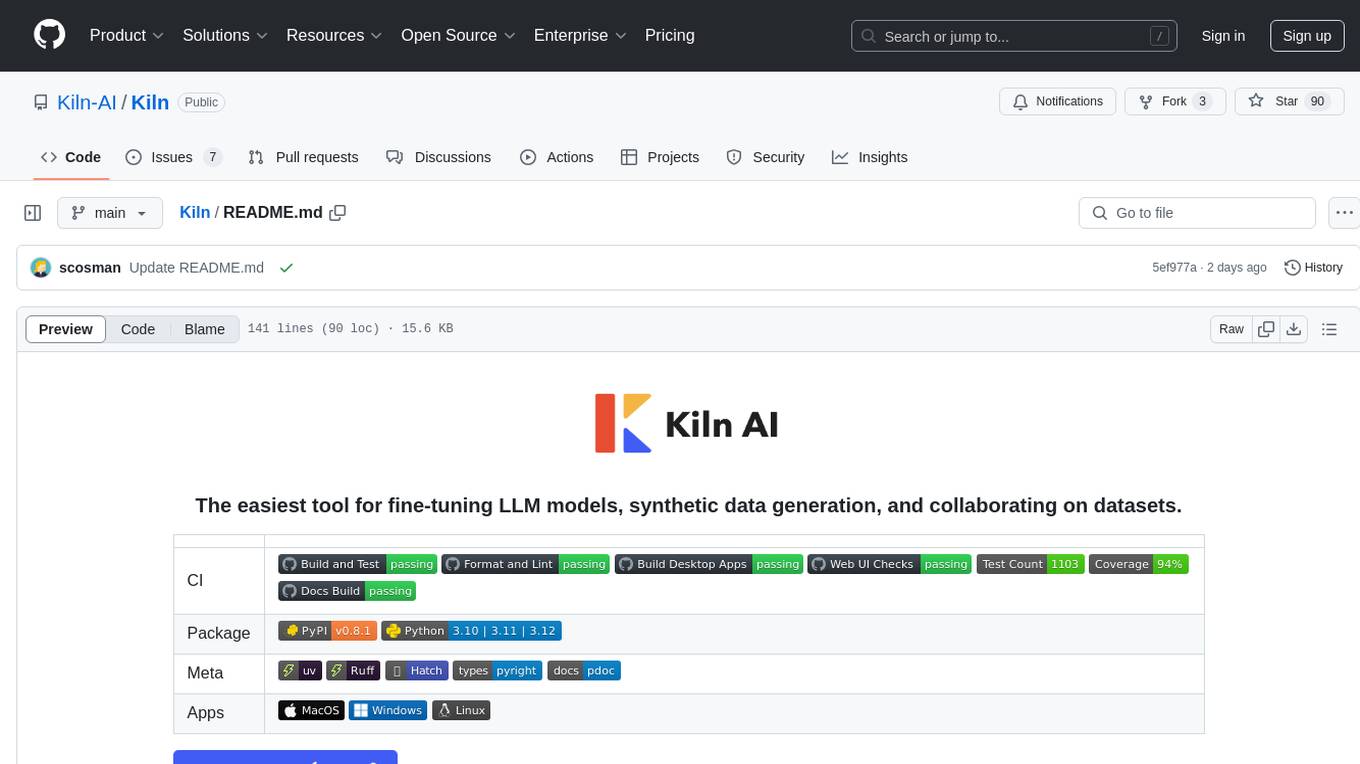
Kiln
Kiln is an intuitive tool for fine-tuning LLM models, generating synthetic data, and collaborating on datasets. It offers desktop apps for Windows, MacOS, and Linux, zero-code fine-tuning for various models, interactive data generation, and Git-based version control. Users can easily collaborate with QA, PM, and subject matter experts, generate auto-prompts, and work with a wide range of models and providers. The tool is open-source, privacy-first, and supports structured data tasks in JSON format. Kiln is free to use and helps build high-quality AI products with datasets, facilitates collaboration between technical and non-technical teams, allows comparison of models and techniques without code, ensures structured data integrity, and prioritizes user privacy.
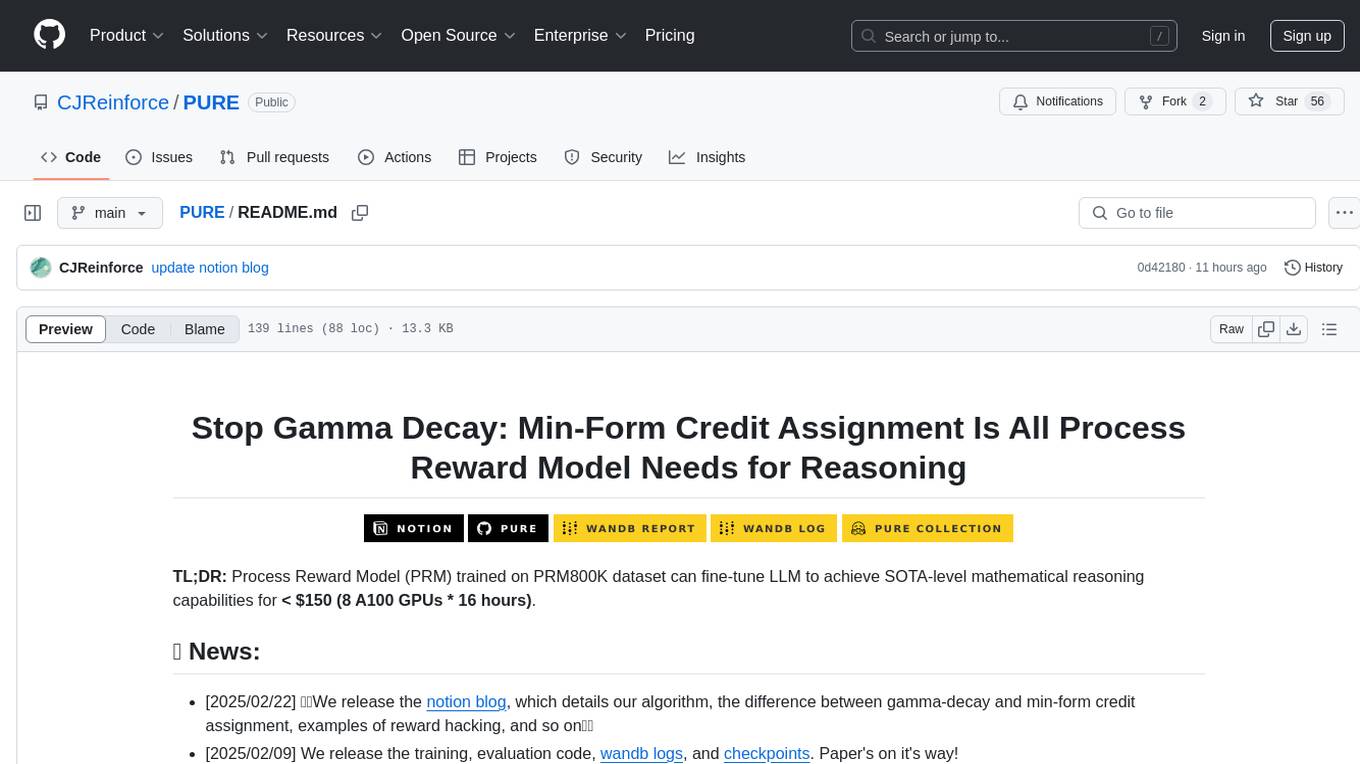
PURE
PURE (Process-sUpervised Reinforcement lEarning) is a framework that trains a Process Reward Model (PRM) on a dataset and fine-tunes a language model to achieve state-of-the-art mathematical reasoning capabilities. It uses a novel credit assignment method to calculate return and supports multiple reward types. The final model outperforms existing methods with minimal RL data or compute resources, achieving high accuracy on various benchmarks. The tool addresses reward hacking issues and aims to enhance long-range decision-making and reasoning tasks using large language models.
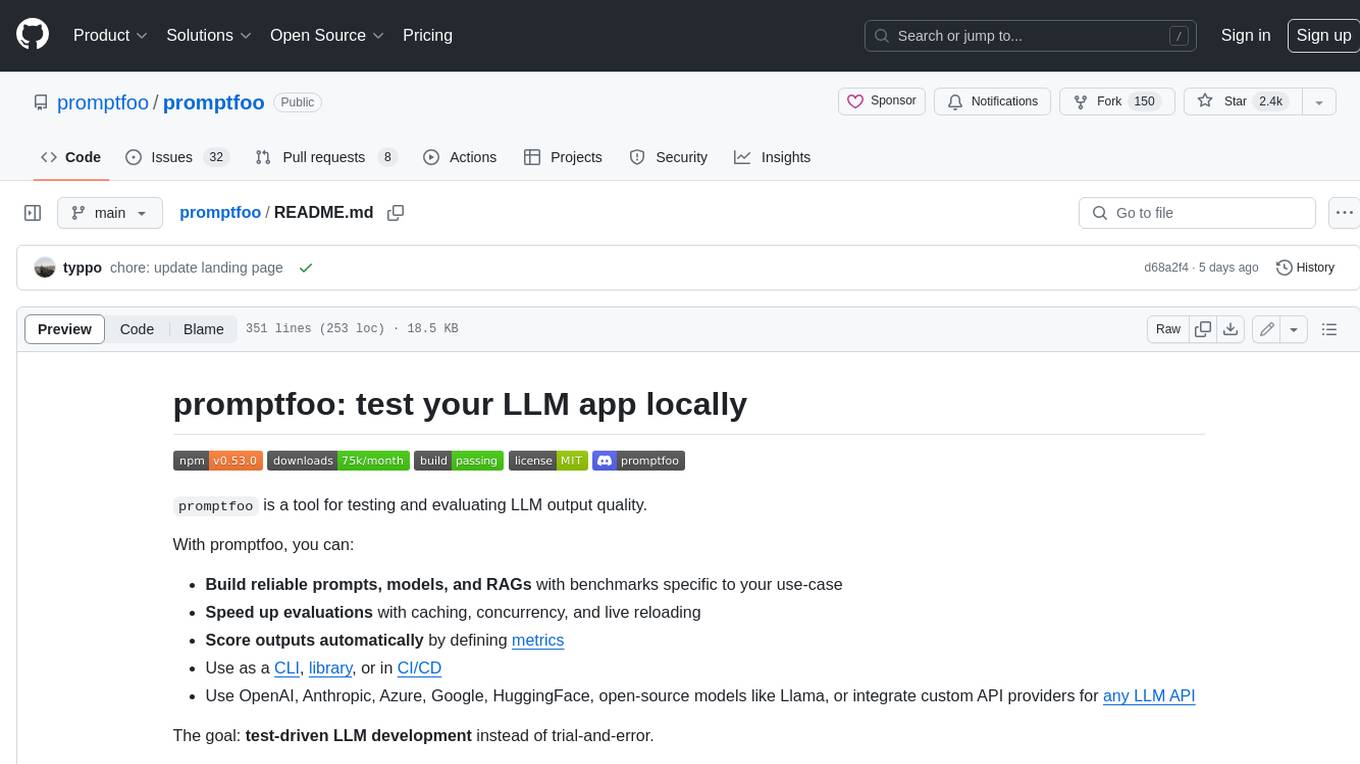
promptfoo
Promptfoo is a tool for testing and evaluating LLM output quality. With promptfoo, you can build reliable prompts, models, and RAGs with benchmarks specific to your use-case, speed up evaluations with caching, concurrency, and live reloading, score outputs automatically by defining metrics, use as a CLI, library, or in CI/CD, and use OpenAI, Anthropic, Azure, Google, HuggingFace, open-source models like Llama, or integrate custom API providers for any LLM API.
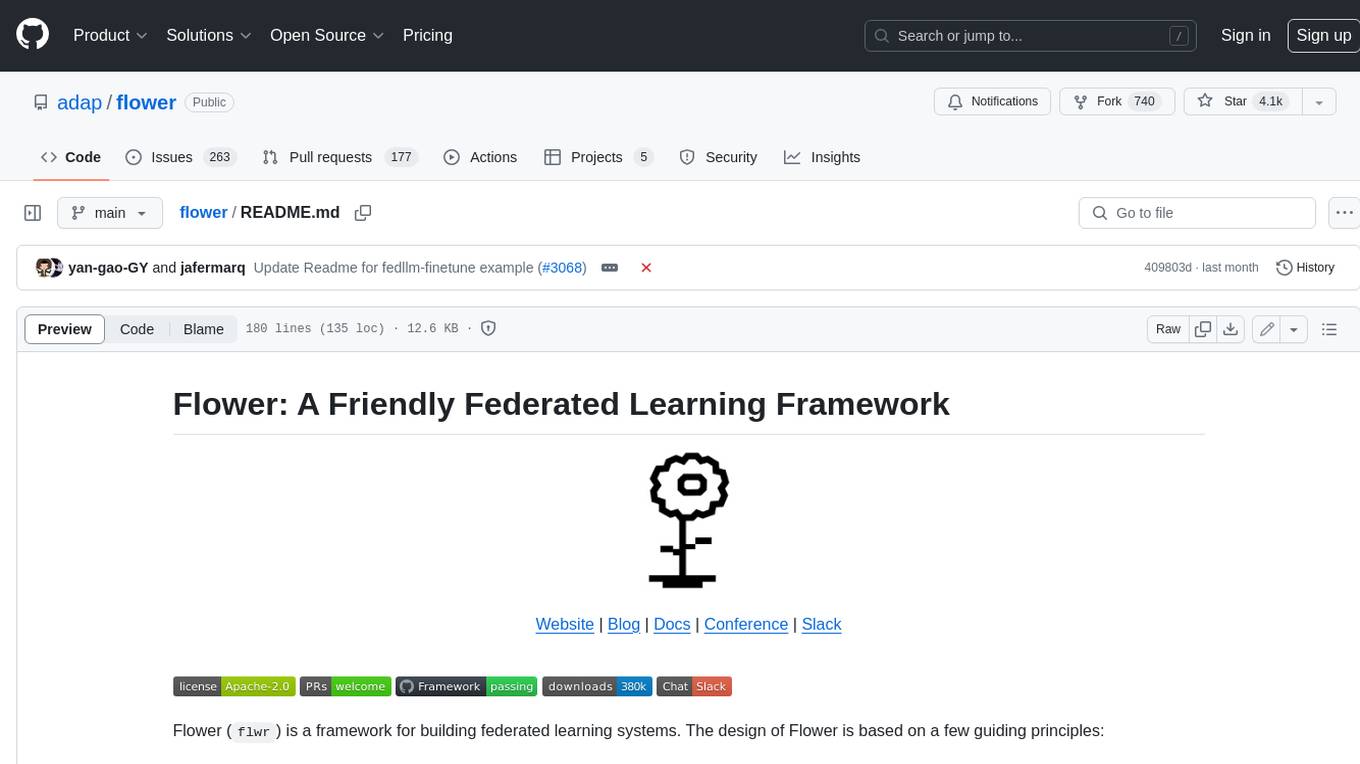
flower
Flower is a framework for building federated learning systems. It is designed to be customizable, extensible, framework-agnostic, and understandable. Flower can be used with any machine learning framework, for example, PyTorch, TensorFlow, Hugging Face Transformers, PyTorch Lightning, scikit-learn, JAX, TFLite, MONAI, fastai, MLX, XGBoost, Pandas for federated analytics, or even raw NumPy for users who enjoy computing gradients by hand.
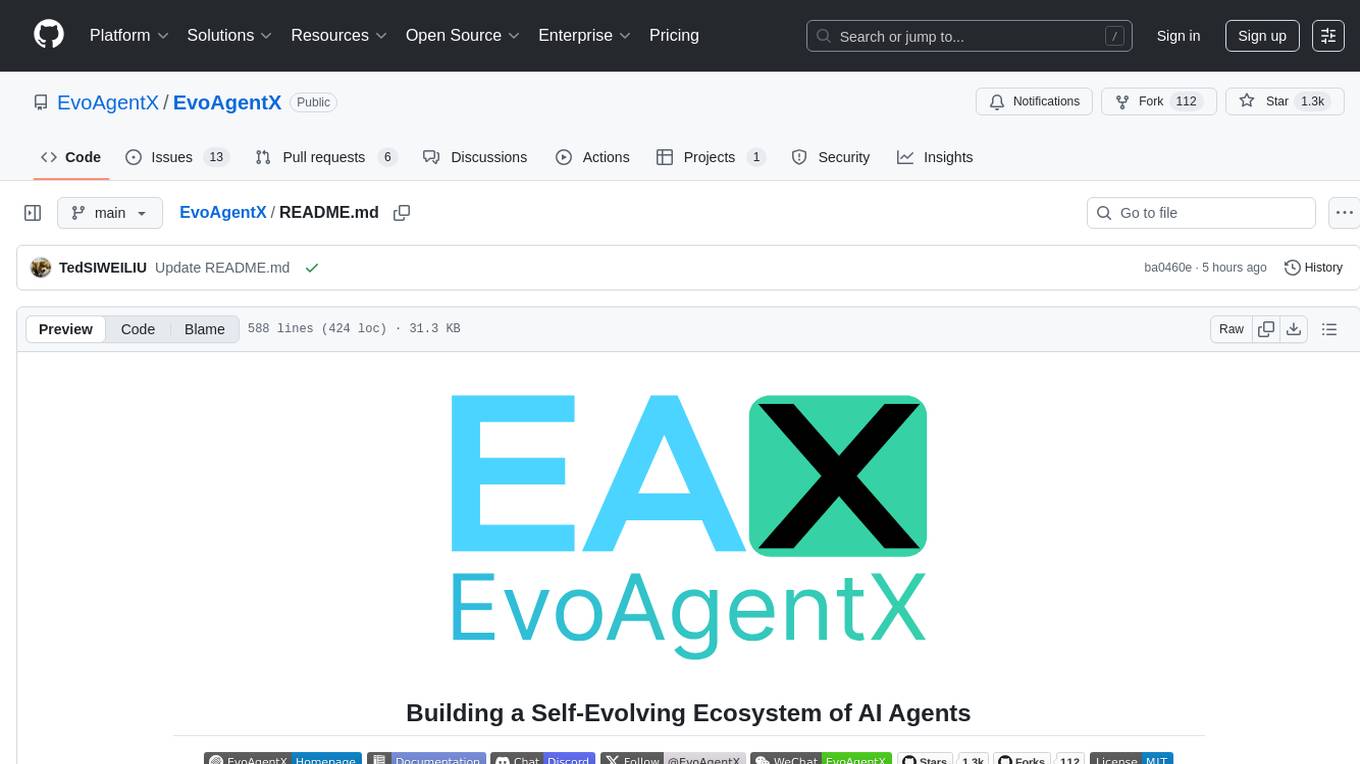
EvoAgentX
EvoAgentX is an open-source framework for building, evaluating, and evolving LLM-based agents or agentic workflows in an automated, modular, and goal-driven manner. It enables developers and researchers to move beyond static prompt chaining or manual workflow orchestration by introducing a self-evolving agent ecosystem. The framework includes features such as agent workflow autoconstruction, built-in evaluation, self-evolution engine, plug-and-play compatibility, comprehensive built-in tools, memory module support, and human-in-the-loop interactions.
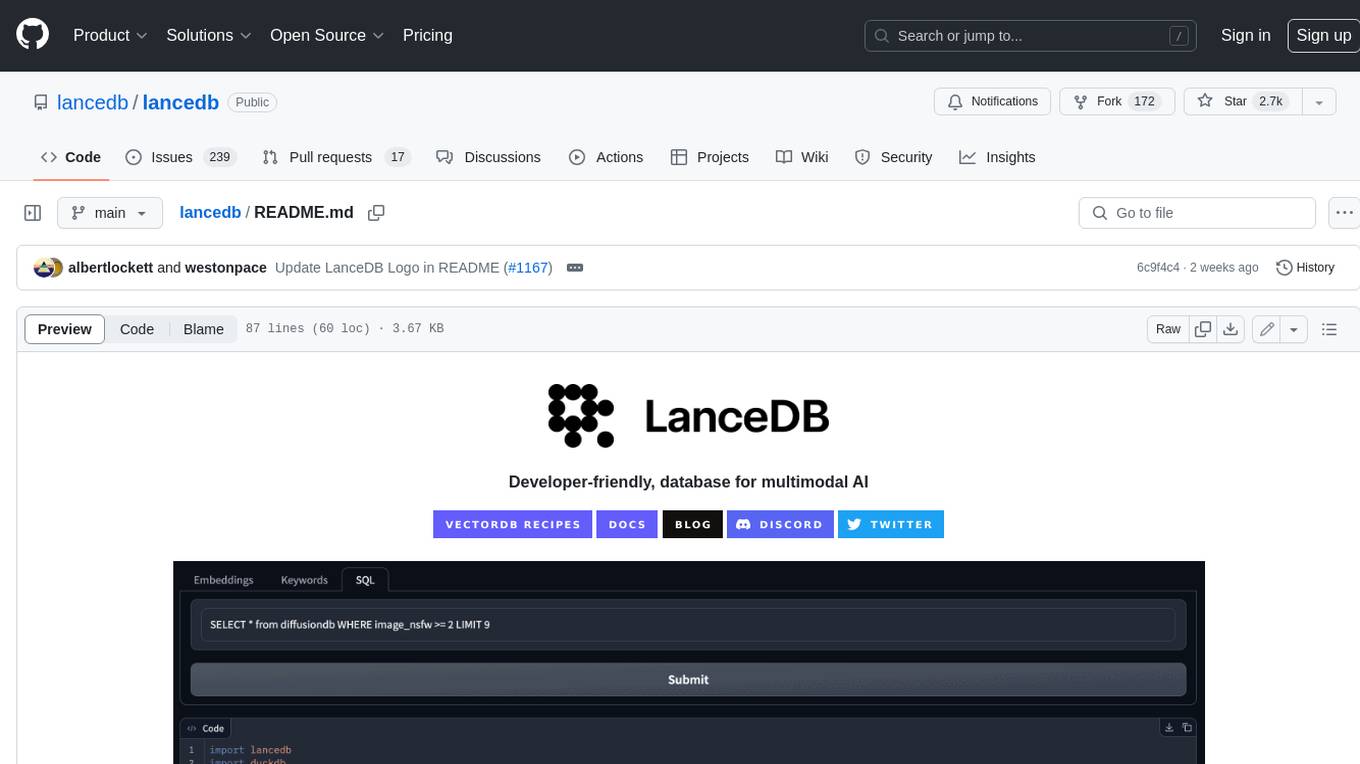
lancedb
LanceDB is an open-source database for vector-search built with persistent storage, which greatly simplifies retrieval, filtering, and management of embeddings. The key features of LanceDB include: Production-scale vector search with no servers to manage. Store, query, and filter vectors, metadata, and multi-modal data (text, images, videos, point clouds, and more). Support for vector similarity search, full-text search, and SQL. Native Python and Javascript/Typescript support. Zero-copy, automatic versioning, manage versions of your data without needing extra infrastructure. GPU support in building vector index(*). Ecosystem integrations with LangChain 🦜️🔗, LlamaIndex 🦙, Apache-Arrow, Pandas, Polars, DuckDB, and more on the way. LanceDB's core is written in Rust 🦀 and is built using Lance, an open-source columnar format designed for performant ML workloads.
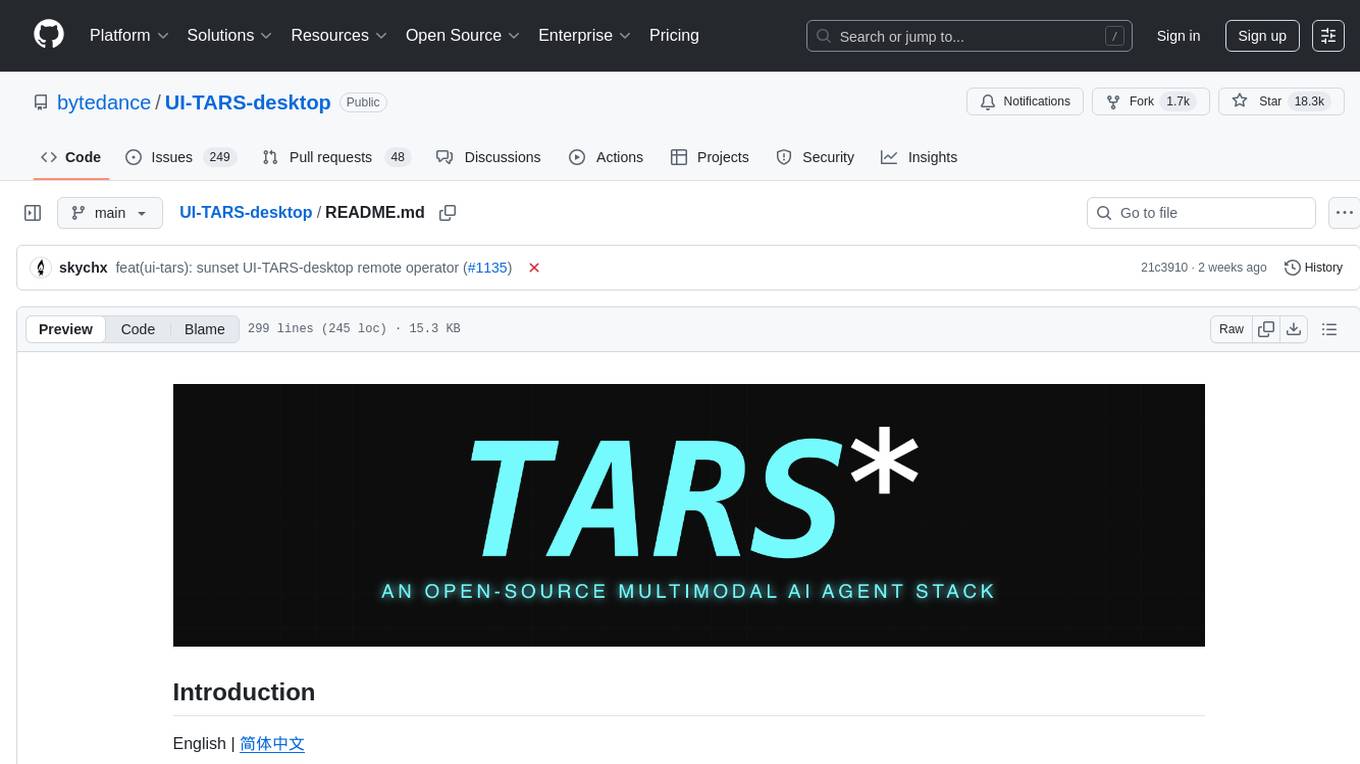
UI-TARS-desktop
UI-TARS-desktop is a desktop application that provides a native GUI Agent based on the UI-TARS model. It offers features such as natural language control powered by Vision-Language Model, screenshot and visual recognition support, precise mouse and keyboard control, cross-platform support (Windows/MacOS/Browser), real-time feedback and status display, and private and secure fully local processing. The application aims to enhance the user's computer experience, introduce new browser operation features, and support the advanced UI-TARS-1.5 model for improved performance and precise control.

anything-llm
AnythingLLM is a full-stack application that enables you to turn any document, resource, or piece of content into context that any LLM can use as references during chatting. This application allows you to pick and choose which LLM or Vector Database you want to use as well as supporting multi-user management and permissions.
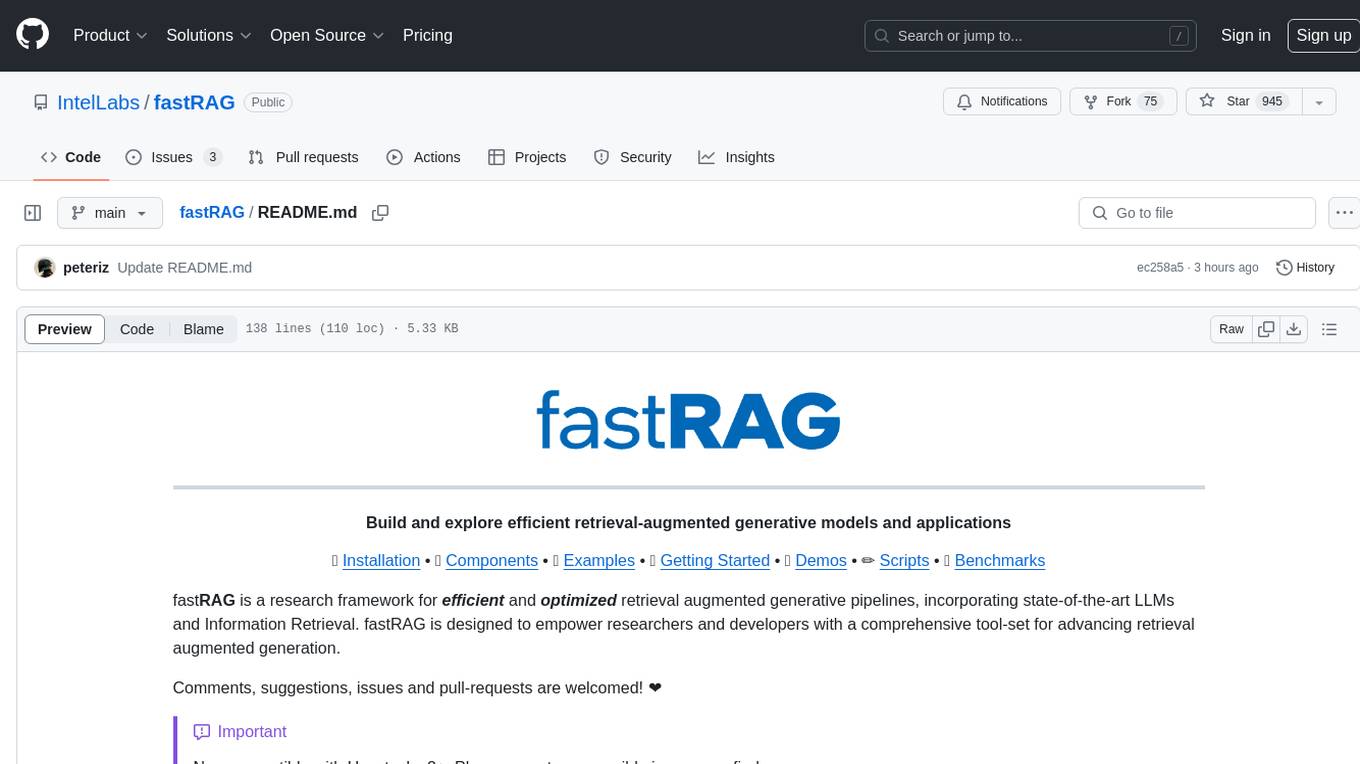
fastRAG
fastRAG is a research framework designed to build and explore efficient retrieval-augmented generative models. It incorporates state-of-the-art Large Language Models (LLMs) and Information Retrieval to empower researchers and developers with a comprehensive tool-set for advancing retrieval augmented generation. The framework is optimized for Intel hardware, customizable, and includes key features such as optimized RAG pipelines, efficient components, and RAG-efficient components like ColBERT and Fusion-in-Decoder (FiD). fastRAG supports various unique components and backends for running LLMs, making it a versatile tool for research and development in the field of retrieval-augmented generation.
For similar tasks

kornia
Kornia is a differentiable computer vision library for PyTorch. It consists of a set of routines and differentiable modules to solve generic computer vision problems. At its core, the package uses PyTorch as its main backend both for efficiency and to take advantage of the reverse-mode auto-differentiation to define and compute the gradient of complex functions.
For similar jobs

spear
SPEAR (Simulator for Photorealistic Embodied AI Research) is a powerful tool for training embodied agents. It features 300 unique virtual indoor environments with 2,566 unique rooms and 17,234 unique objects that can be manipulated individually. Each environment is designed by a professional artist and features detailed geometry, photorealistic materials, and a unique floor plan and object layout. SPEAR is implemented as Unreal Engine assets and provides an OpenAI Gym interface for interacting with the environments via Python.

openvino
OpenVINO™ is an open-source toolkit for optimizing and deploying AI inference. It provides a common API to deliver inference solutions on various platforms, including CPU, GPU, NPU, and heterogeneous devices. OpenVINO™ supports pre-trained models from Open Model Zoo and popular frameworks like TensorFlow, PyTorch, and ONNX. Key components of OpenVINO™ include the OpenVINO™ Runtime, plugins for different hardware devices, frontends for reading models from native framework formats, and the OpenVINO Model Converter (OVC) for adjusting models for optimal execution on target devices.
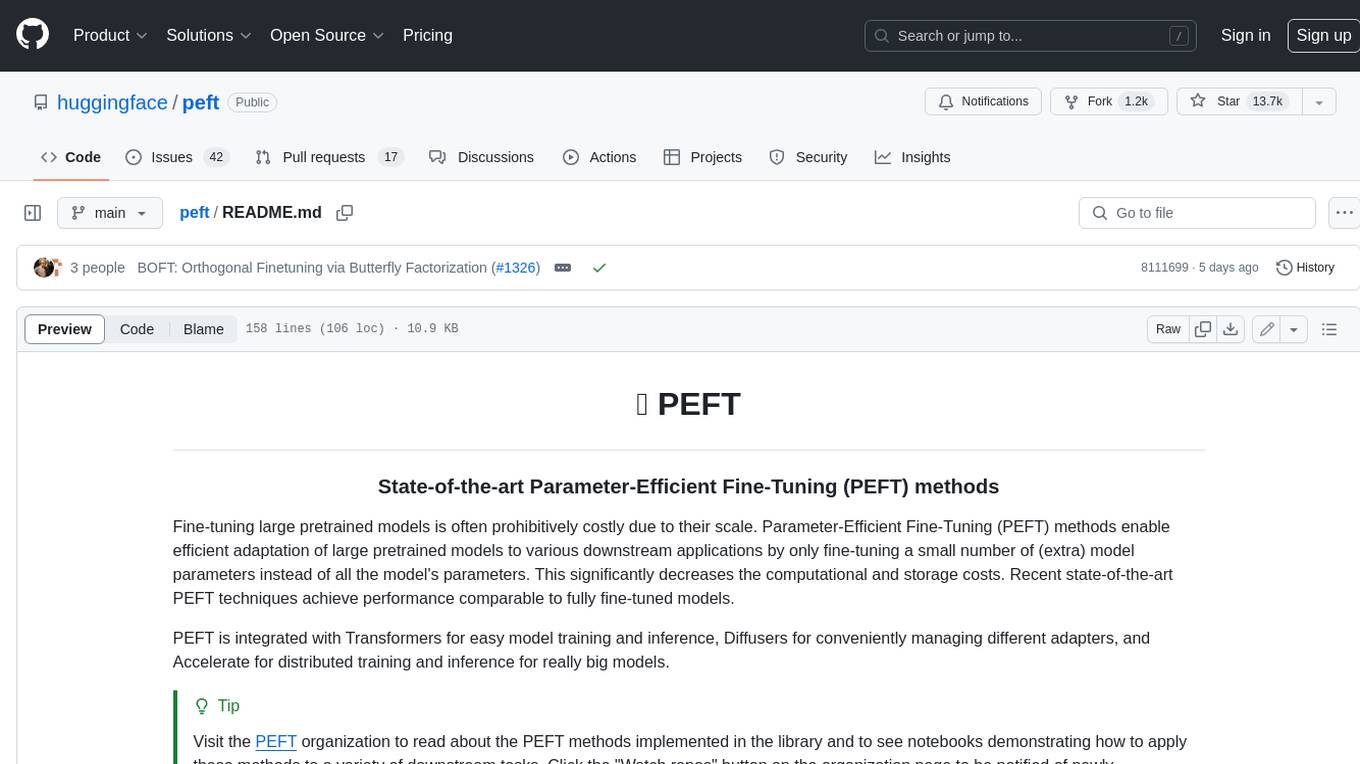
peft
PEFT (Parameter-Efficient Fine-Tuning) is a collection of state-of-the-art methods that enable efficient adaptation of large pretrained models to various downstream applications. By only fine-tuning a small number of extra model parameters instead of all the model's parameters, PEFT significantly decreases the computational and storage costs while achieving performance comparable to fully fine-tuned models.
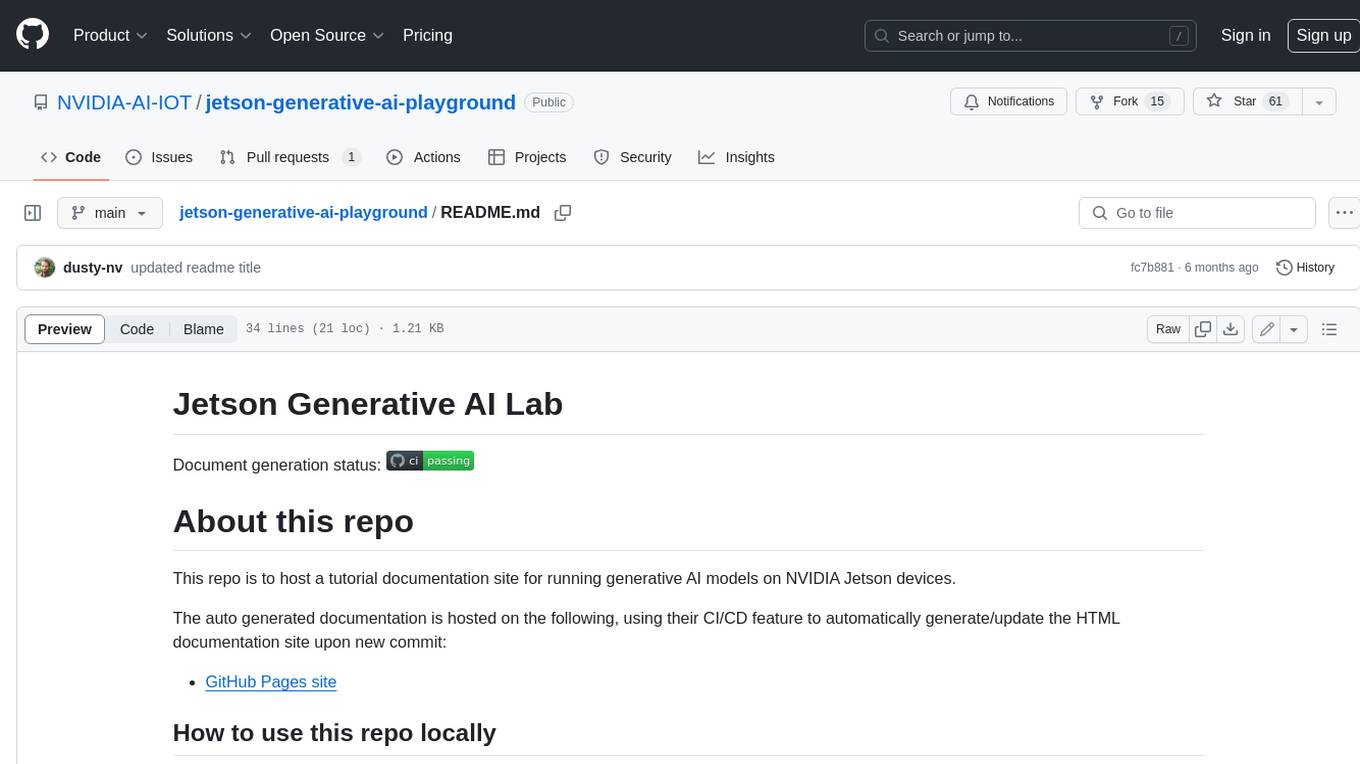
jetson-generative-ai-playground
This repo hosts tutorial documentation for running generative AI models on NVIDIA Jetson devices. The documentation is auto-generated and hosted on GitHub Pages using their CI/CD feature to automatically generate/update the HTML documentation site upon new commits.
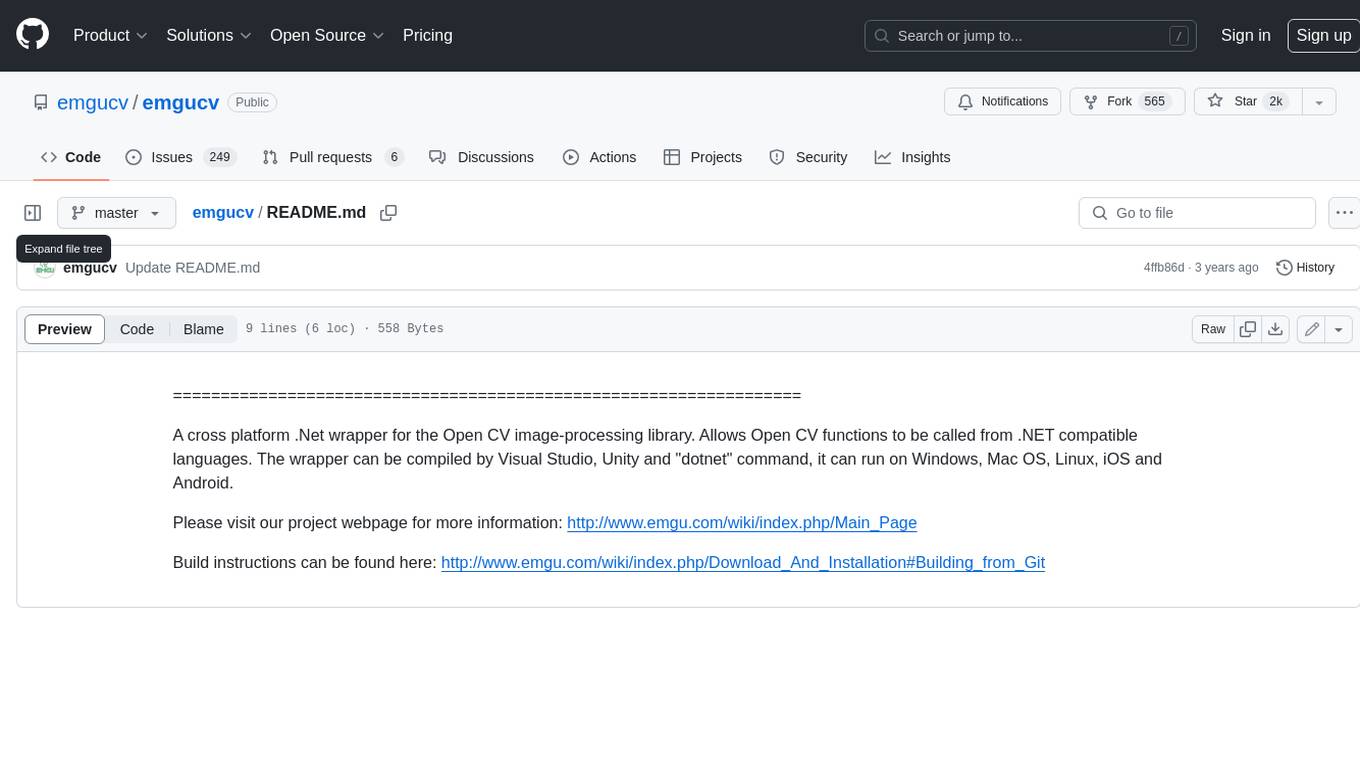
emgucv
Emgu CV is a cross-platform .Net wrapper for the OpenCV image-processing library. It allows OpenCV functions to be called from .NET compatible languages. The wrapper can be compiled by Visual Studio, Unity, and "dotnet" command, and it can run on Windows, Mac OS, Linux, iOS, and Android.
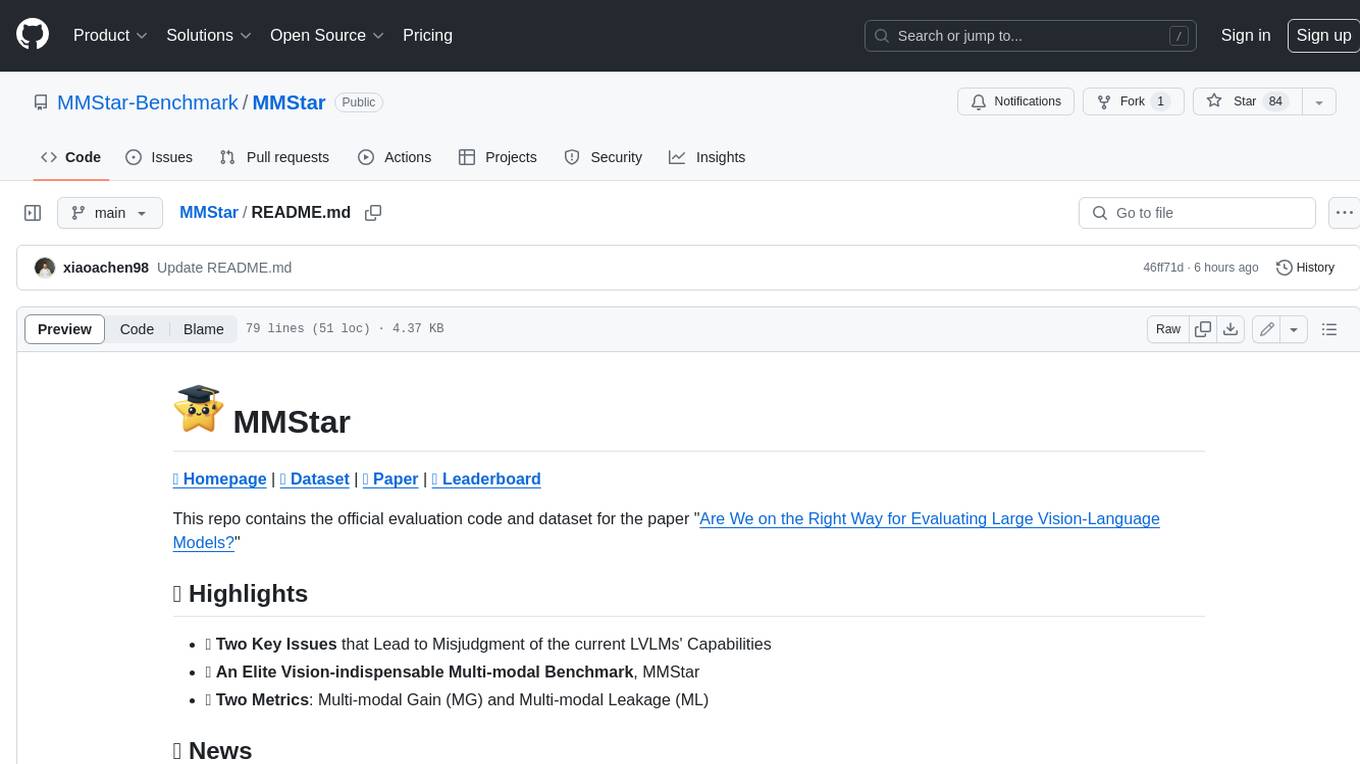
MMStar
MMStar is an elite vision-indispensable multi-modal benchmark comprising 1,500 challenge samples meticulously selected by humans. It addresses two key issues in current LLM evaluation: the unnecessary use of visual content in many samples and the existence of unintentional data leakage in LLM and LVLM training. MMStar evaluates 6 core capabilities across 18 detailed axes, ensuring a balanced distribution of samples across all dimensions.
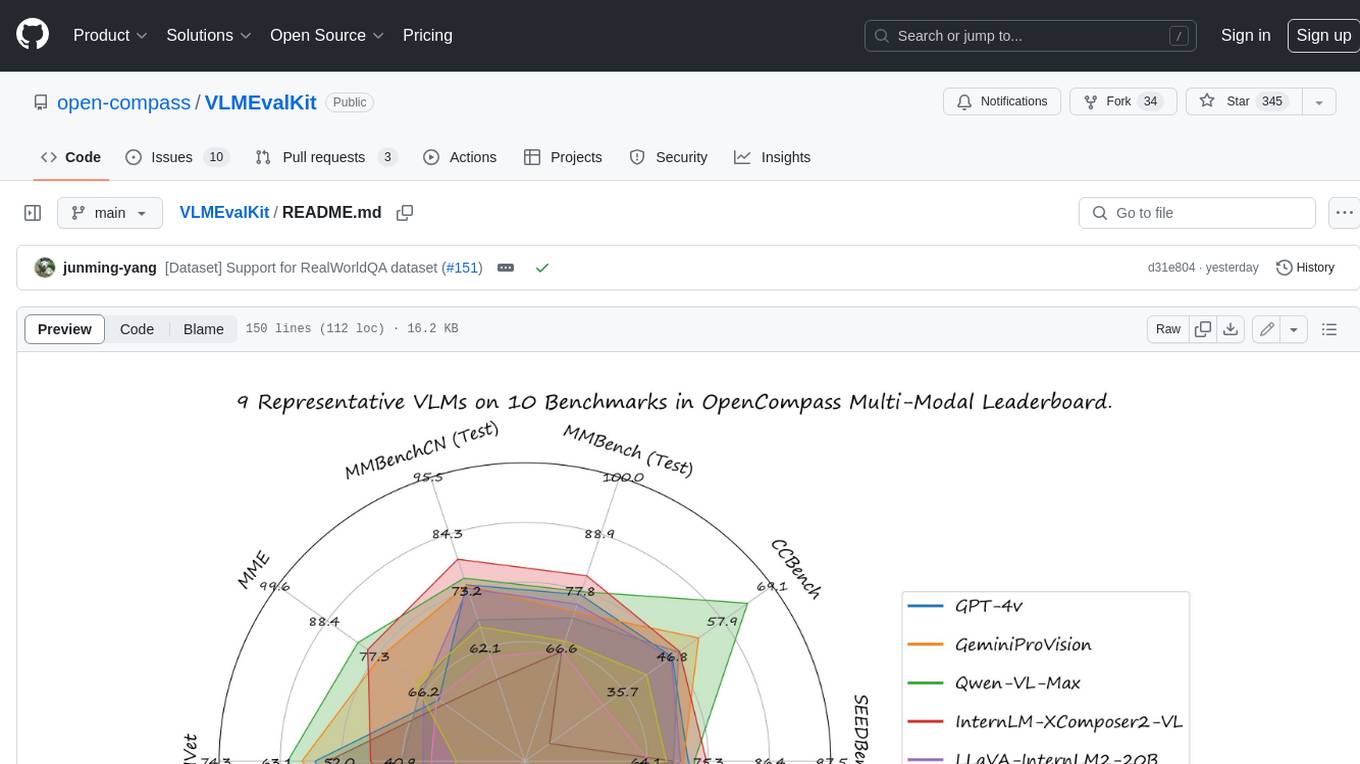
VLMEvalKit
VLMEvalKit is an open-source evaluation toolkit of large vision-language models (LVLMs). It enables one-command evaluation of LVLMs on various benchmarks, without the heavy workload of data preparation under multiple repositories. In VLMEvalKit, we adopt generation-based evaluation for all LVLMs, and provide the evaluation results obtained with both exact matching and LLM-based answer extraction.

llava-docker
This Docker image for LLaVA (Large Language and Vision Assistant) provides a convenient way to run LLaVA locally or on RunPod. LLaVA is a powerful AI tool that combines natural language processing and computer vision capabilities. With this Docker image, you can easily access LLaVA's functionalities for various tasks, including image captioning, visual question answering, text summarization, and more. The image comes pre-installed with LLaVA v1.2.0, Torch 2.1.2, xformers 0.0.23.post1, and other necessary dependencies. You can customize the model used by setting the MODEL environment variable. The image also includes a Jupyter Lab environment for interactive development and exploration. Overall, this Docker image offers a comprehensive and user-friendly platform for leveraging LLaVA's capabilities.






